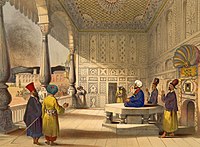Kochis



| Part of a series on |
| Pashtuns |
|---|
| Empires and dynasties |
Kochis or Kuchis (
Description
The National Multi-sectoral Assessment of Kochi in 2004 estimated that there are about 2.4 million Kochis in Afghanistan, with around 1.5 million (60%) remaining fully nomadic; over 100,000 have been displaced due to natural disasters such as flood and drought in the past few years.[3]
The nomads and semi-nomads, generally called Kuchi in Afghanistan, mostly keep sheep and goats. The produce of the animals (meat, dairy products, hair and wool) is exchanged or sold in order to purchase grain, vegetables, fruit and other products of settled life. In this way an extensive network of exchange has developed along the main routes annually followed by the nomads. The merchant Powindah (Ghilji) [or Ghilzai] Pashtuns used to move annually from the Afghanistan mountains to the valley of the Indus. These long-distance migrations were stopped in the early 1960s when the border with Afghanistan and Pakistan were closed, but many Kuchis are still allowed to cross as border officials recognize the Kuchi migrations which occur seasonally and allow them to pass even in times of political turmoil. In recent decades, migrations inside Afghanistan continue, although trucks are now often being used to transport livestock and family from one place to another.[4]
History
| History of Afghanistan | |
|---|---|
 | |
| Timeline | |
| 410–557 | |
| Nezak Huns | 484–711 |
Kochis historically abstained from politics, because they are nomadic, but under Afghanistan's constitution, they were given ten seats in parliament. Provisions are written into the

Kochis were also favored by the Kings of Afghanistan, who were themselves ethnic Pashtuns, since the late 1880s. They were awarded "
Kochis have been identified by the United Nations Assistance Mission in Afghanistan as one of the largest vulnerable populations in the country. As Afghanistan's population grows, competing claims over summer pastures, both for rainfed cultivation and for grazing of the settled communities' livestock, have created conflict over land across central and northern Afghanistan. Paying head-count fees for each animal crossing someone else's property is exacting a harsh economic toll on the Kochi way of life, one that is already having to contend with recurrent droughts that are now occurring with increasing frequency.[11] There are communities of Pashtun Kochi origin in other parts of the world as well, including in the Caribbean, Africa and Europe. In Pakistan, some Kochis are found in Khyber Pakhtunkhwa.
In Popular Culture
James A. Michener describes Kochi life in his 1963 novel Caravans, set in 1946 Afghanistan.
Gallery
-
Kochis nearUrozgan Provinceof Afghanistan
-
Kochi tent near theKabul-Jalalabad Road
-
A young Kochi girl
Footnotes
- JSTOR 20203586. Retrieved 7 May 2021.
- ^ NPS. "Program for Culture and Conflict Studies at NPS - Home". nps.edu.
- ^ World Food Program, Socio-economic profile, Population and Demography, Afghanistan. Retrieved at "Archived copy". Archived from the original on 2012-12-18. Retrieved 2012-03-29.
{{cite web}}: CS1 maint: archived copy as title (link) - ^ Willem Vogelsang (2002), p. 15.
- ^ "Afghanistan Online: The Constitution of Afghanistan". afghan-web.com.
- ^ UNHCR, Formation of 4 Kuchi sheep/goat breeders’ service centres, Durable solutions for Kuchi IDP's in the south of Afghanistan: Options and opportunities, Asia Consultants International, pg. 15
- ISBN 0-7546-3615-1, page 16: "The modern history of Afghanistan has witnessed a "Pashtunization" of the state as the customs, traditions and language of the Pashtuns have combined with the groups political power to erode the distinctive underpinnings of Afghanistan's other groups.FN20". FN20 cites: US, Department of the Army, Afghanistan: A Country Study, 5th ed. reprint (Washington, DC.: GPO, 1985) page 108.
- ISBN 0-8223-1190-9.
- ^ Afghanistan, by Gilles Dorronsoro
- ^ "Wandering Kuchis pay for their Taliban links". theage.com.au. 27 August 2005.
- ^ "Archived copy". Archived from the original on 2008-12-10. Retrieved 2008-12-22.
{{cite web}}: CS1 maint: archived copy as title (link)
References
- Vogelsang, Willem. 2002. The Afghans. Blackwell Publishers, Oxford. ISBN 0-631-19841-5



